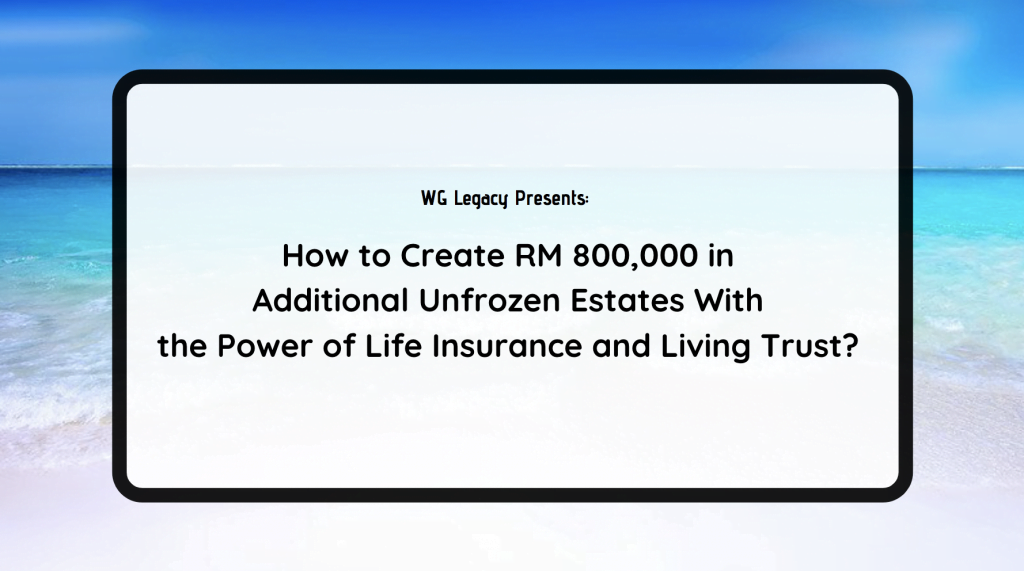Question:
Hi, my name is Wong. I’m 55 years old and I have just retired.
As I write, I have amassed RM 1 million in EPF and RM 500,000 in cash savings.
I have purchased a life insurance policy, where the sum assured is RM 500,000. I have nominated my wife, a homemaker, to be my sole beneficiary.
I have a son named Jim. Jim is 30 years old and he is married with 2 sons.
I want to enjoy my retirement. But yet, at the same time, I want to leave behind a sizable estate for my loved ones, including my two little grandsons. As such, in this light, my question is, ‘Should I write myself a will to bequeath all my current assets to my family members?’
Answer:
The answer is yes and no.
It depends on how Wong chooses to manage his assets in his retirement years.
In this article, I’ll share two methods of how Wong could manage his assets and how the two methods will impact the value of estates he would bequeath to all his family members when he passes on in the future.
Method 1: The Capital Protector
First, Wong could choose to preserve his capital indefinitely and live off with his EPF dividends and FD interests. Of which, the amount he could spend is around RM 5,833 a month.

Let’s assume Wong passes on.
He will leave behind an estate worth RM 2 million. Of which, the RM 500,000 in his FD accounts shall be frozen upon his death. So, before his death, it would be helpful for Wong to write himself a will to speed up the process of unlocking his FD accounts and the distribution of them to his beneficiaries.
Meanwhile, his EPF account and the sum assured of his life insurance policy will not be frozen. They will be distributed to Wong’s nominated beneficiaries upon his death.
Method 2: The Estate Maximizer
Alternatively, Wong could do the following:
1. EPF Account
Wong could retain his EPF account to earn dividends to support his living costs.
2. Cash Trust Account
A cash trust account is a form of living trust that administers the cash put within it.
Wong can set up three different cash trust accounts for the following purposes:

As long as Wong is healthy and able, he could earn a projected interests of 5% – 7% per annum. Here, if we take the middle point of 6% a year, Wong can collect as much as RM 18,000 a year in extra income, which he could spend it on:
3. Life Insurance Policy
Wong could buy a life insurance policy with a sum assured of RM 1 million, with the additional RM 18,000 a year of income received from his cash trusts.
4. Excess Cash
Finally, he will still have a balance of RM 200,000 in cash.
He can either choose to:
a. Contribute RM 60,000 per year voluntarily into his EPF account. With that, he could put in RM 60,000, RM 60,000, RM 60,000 and RM 20,000 into his EPF and thus, raising his annual EPF dividends.
b. Keep all RM 200,000 into his FD accounts as emergency funds.
c. Spend an average of RM 10,000 a year on hobbies and entertainment for the next 20 years of his retirement.
Here, for simplicity’s sake, let’s say Wong spent his RM 200,000 entirely on road trips across Malaysia, holidays in Taiwan, China, Japan, and Korea and as well as his scuba diving activities in beaches across Southeast Asia. Hence, he had lived and enjoyed his retirement life to the fullest.
Question: ‘How much estates Wong will be leaving behind to his loved ones?’
The answer is RM 2.8 million, which consists of:

This amount is RM 800,000 more than the amount bequeathed via Method 1.
And the best part is this –
The entire RM 2.8 million will not be frozen upon Wong’s death. This is because he uses EPF, life insurance and living trusts as distributing vehicles of his current assets, where assets in these 3 vehicles will not be frozen upon one’s passing.
The Key Difference that Create RM 800,000 in Additional Estates
Is it due to hard work? Nope.
Is it due to investment smarts? Nope.
Does it involved Wong trying to grow his wealth via business ventures? Nope.
The difference lies in Wong’s knowledge about estate planning matters.
From above, we can see that Wong is still able to pursue his hobbies and have a series of road trips and travel after retirement. If Wong decides not to do any of the above and keep all of his RM 200,000 either his EPF account or FD accounts without spending, Wong would leave behind RM 1 million in additional estates, not RM 800,000, to his family members.
So, the question you want to answer is:
‘Will you be a Capital Protector or an Estate Enhancer?’
If you wish to enquire how you can create additional wealth via estate planning methods, you could start by filling up the form below and book yourself a short 30-minute consultation session, where we’ll brainstorm for ideas to implement customised strategies based on your financial status to creating such wealth for your family members:




